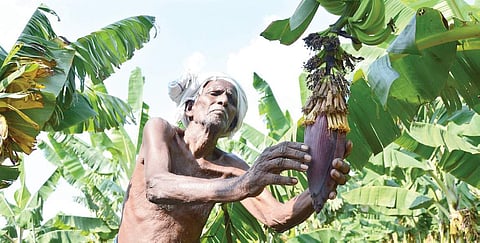

CHENNAI: The sector to take the biggest hit from demonetisation may just turn out to be farming, especially the next rabi crop, if soundings taken by Express across the South are any indication. Shut out of banks and starved of cash for inputs like fertilizer, seeds and pesticides, farmers across the south have slashed their rabi sowing, at some places by more than half the normal acreage.
In Ballari, farmers who had already sown crops when Rs 500 and Rs 1000 notes were withdrawn from the market on November 8 are not much better off and face the risk of losing the investment they had already made. One farmer, Lepakshi Naidu in Hosapete taluk, Karnataka, said he had sown 30 acres of chilli prior to November 8 and now with banks allowing him to withdraw no more than Rs 2000 per day, he was unable to pay workers. The loss of crop over 30 acres could cripple his hopes, he said.
Pesticide dealers confirmed that rabi sowing is down by 80 per cent in Ballari and by at least 40 per cent in Telangana, where a fertilizer trader said he would normally do business of Rs 20-25 lakh per day, but had not sold a single bag of fertilizer all week. Farmers across the peninsula said they would trade their produce for a deep discount if only they would be paid in low-denomination bills. But with no one having small notes, that was a remote possibility.
For tomato farmers in Odisha, prices have fallen so low (Rs 2 per kg in Bargarh) that it was not even worthwhile to transport it to the market. Traders have been absent from auctions in the vegetable markets, and the only consignments moving are those that had been paid for before November 8. Not that such farmers are happier.
Most have put their money in the bank and are now effectively shut out of any access to it. All told, it’s been a vicious cycle for farmers be it in Tamil Nadu, Kerala or Telangana. If in Kerala farmers are unable to repay their loans because their procurement incomes have been delayed, cultivators in Nalgonda, Telangana, said the loans from moneylenders and deposits in banks are out of reach as well while they pay interest on loans.